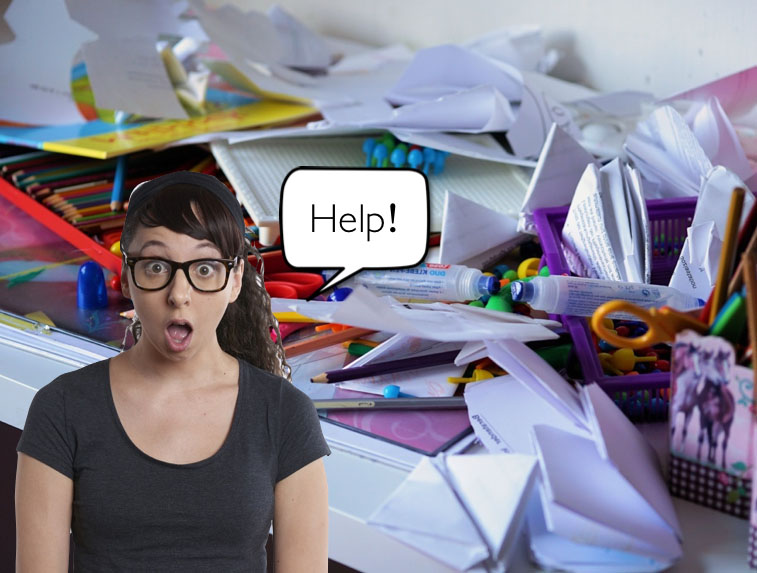Do you feel scattered and overwhelmed? Can’t find the things you need to get started with your work? Is your workspace a mess?
Being disorganised can create inner turmoil, stress and confusion. If you can’t find basic items (e.g. your textbooks or assignment sheet) you run the risk of giving up before you even get started.
Below are 10 strategies to help you become more organised and productive.
1. Make lists (lots of them!)
Lists help us to stay on track. They give us an idea of what our day should look like.
Find yourself faffing around and distracted? Just revisit your list (“Oh yeah, that’s right. I need to be working on that English essay!”).
If your list gets messy and confusing, don’t be afraid to abandon it and create a new one.
As Dr Douglas Puryear states in his book Your life can be better:
“I make lists over and over, all day long. It’s not just about having the list; there is also benefit in making them. Writing down what I need to do is somehow calming and organizing, and therefore motivating. When I write things down, it’s as though I’m on top of them”.
2. Keep chaos at bay
Dr Gabor Mate states in his book Scattered that the physical space you occupy can help to either harmonise or disorganise your mind. If you neglect to honour your physical environment, you neglect to honour yourself.
Do your best to keep mess and clutter under control. You’re not aiming for perfect stock photo tidy or perfect hotel bed tidy. You just want to eliminate anything that could potentially derail you when you study.
I feel like I’m constantly tidying up. Things will be tidy and then a day later, it’s back to chaos. I think, “Ugh. Why do I even bother?”
But Dr Gabor Mate believes that this doesn’t matter. He states:
“The effort itself, in the long term, has an organizing effect on the mind.”
3. Work to a time limit
Feeling overwhelmed by a big project? Relax. You don’t need to do it all at once.
Dr Gabor Mate states:
“The ADD brain is overwhelmed by a multipartite task. She does not know where to turn, the all-or-nothing mindset demands that everything be done at once. Nothing needs to be done at once. The best plan, I find, is not to insist that any one task be finished all at once, but to impose a strict time limit in which to work. When the appointed time period is over, stop.”
So set a timer for 10-15 minutes and make a start on that project you’ve been avoiding. Remember, the key is to focus on process, not finished product.
4. Set up routines, habits and systems
You have a limited amount of attentional resources. Every time you make a decision, you use up some of those mental resources. So what happens is your attentional resources get depleted as the day goes on.
You can avoid wasting your precious mental resources and streamline your day by establishing routines and habits. You can read more about establishing different routines here.
5. Use a big wall calendar
Have you ever underestimated the amount of time an assignment would take to do?
Enter the yearly planner.
The beauty of a yearly planner is you can see how many days you have between now and when the piece of work is due.
Picture this: you look at your planner and see that you’ve got less than 2 weeks to go before an important exam. This is what you need to propel you into action. You realise, “I don’t have all the time in the world to do this. I better get started, even if it’s something small”.
In short, a yearly planner can break the tendency we all have to procrastinate.
6. Avoid sloppiness (put things away)
Finished working on a project? It’s easy to just leave it in a heap on the table. But it’s best practice to force yourself to put it away. Here’s why …
When you leave projects out, they can get jumbled into one big heap. That big heap becomes mentally overwhelming. You’re not quite sure what projects are in there.
So what do you do? You just ignore it. The problem is the pile of projects keeps growing and before you know it, everything feels out of control!
So once you are done, take a minute to make a note of what your next action is on the project, then pick your stuff up and pop it away (note: I recommend using an open storage system like this one).
It takes less than a minute to put your things away but it can save you hours of time down the track!
7. Create a book of checklists
Are there certain jobs you need to do over and over again? For these jobs, you need checklists. I have checklists for the items that I need for the following situations:
I file all these checklists away in one central location. Before I leave the house, I find the checklist I need and I do a quick scan to see if I’ve missed anything. I’m amazed how often there’s an item I’ve forgotten to pack. But I don’t beat myself up about it. I grab the item and go!
8. Pack your bag the night before
If you wake up late and have to pack your bag in a hurry, you’re more likely to not look at your checklist and subsequently, you’ll forget something important
Having everything packed for the next day gives you a sense of being in control. It also gives your subconscious time to think about whether you’ve forgotten anything.
9. Set goals and intentions
I know what you’re thinking, “Ugh. Goal setting!” But goal setting is one seriously misunderstood technique.
All a goal is is something you want to do. Why set goals? Because they motivate you. They focus your mind on what you need to do.
To help you set weekly and daily goals, here are some good questions to ask:
Here’s a tip: set specific goals you can easily cross off a list and restrict your list to 3-5 goals at a time.
If you set 20+ goals for the day and only achieve 3 of them, you’ll feel discouraged. You won’t want to start on the next task or stick to it. But if you set 5 goals and manage to knock off 4 of them, you’ll feel like you’re making progress.
As Dr Douglas Puryear states:
“Life feels better and goes better when you’re achieving your goals.”
10. Remind yourself of your goals
There are so many things that can derail you from doing your most important work. But having reminders in your environment can help you stay on track.
For example, I have a whiteboard in my office and I write my most important goals down with coloured pens. I also use post-it notes and a program called Complice to help me stay focused.
When it comes to making your reminders, make sure you change them every few days. Why? Because your brain will get bored and start to tune out. So keep your brain stimulated by using different colours, changing the wording and drawing funny pictures.
To sum up
I realise there is a lot of information here. It’s easy to find this blog post overwhelming and think, “It’s all too hard!” and do nothing. But remember, you don’t have to do all of the things I’m suggesting. Just start with one or two things. Master those. And then pick another. Before you know it, you’ll be feeling more organised and in control than ever before.





